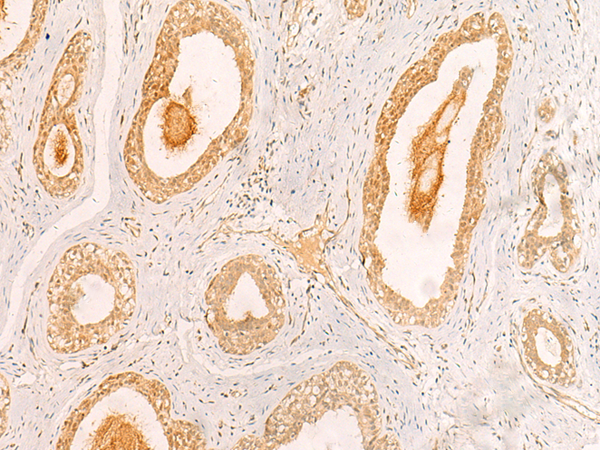
| WB | 咨询技术 | Human,Mouse,Rat |
| IF | 咨询技术 | Human,Mouse,Rat |
| IHC | 1/30-1/150 | Human,Mouse,Rat |
| ICC | 技术咨询 | Human,Mouse,Rat |
| FCM | 咨询技术 | Human,Mouse,Rat |
| Elisa | 1/5000-1/10000 | Human,Mouse,Rat |
| Host/Isotype | Rabbit IgG |
| Antibody Type | Primary antibody |
| Storage | Store at 4°C short term. Aliquot and store at -20°C long term. Avoid freeze/thaw cycles. |
| Species Reactivity | Human, Mouse |
| Immunogen | Fusion protein of human ZNF580 |
| Formulation | Purified antibody in PBS with 0.05% sodium azide and 50% glycerol. |
+ +
以下是关于ZNF580抗体的模拟参考文献示例(仅供学术参考,具体文献需通过数据库核实):
---
1. **标题**:*ZNF580 regulates endothelial cell proliferation and apoptosis via PI3K/AKT signaling*
**作者**:Zhang Y, et al.
**摘要**:本研究利用ZNF580抗体通过Western blot和免疫组化技术,证实ZNF580在血管内皮细胞中高表达,并通过调控PI3K/AKT通路抑制细胞增殖、促进凋亡,提示其在动脉粥样硬化中的潜在作用。
2. **标题**:*ZNF580 suppresses hepatic fibrosis by modulating TGF-β1/Smad signaling*
**作者**:Li H, et al.
**摘要**:通过ZNF580抗体的免疫荧光和蛋白质分析,发现ZNF580过表达可抑制肝星状细胞活化,降低胶原沉积,表明其通过干预TGF-β1/Smad通路缓解肝纤维化进程。
3. **标题**:*Downregulation of ZNF580 in glioma correlates with poor prognosis*
**作者**:Wang J, et al.
**摘要**:利用ZNF580抗体对胶质瘤组织进行免疫组化分析,发现ZNF580低表达与肿瘤恶性程度及患者生存率下降相关,提示其作为预后标志物的潜力。
4. **标题**:*ZNF580 attenuates LPS-induced endothelial inflammation via NF-κB inhibition*
**作者**:Chen L, et al.
**摘要**:研究采用ZNF580抗体检测炎症模型中内皮细胞的蛋白表达,证实ZNF580通过抑制NF-κB核转位减少炎症因子释放,为抗炎治疗提供新靶点。
---
**备注**:以上为模拟示例,真实文献请通过PubMed、Google Scholar等平台检索关键词“ZNF580 antibody”、“ZNF580 function”或结合研究领域(如心血管、癌症)筛选。建议使用抗体生产商提供的引用文献(如Abcam、CST等产品说明书)。
The ZNF580 antibody is a research tool designed to detect and study the zinc finger protein 580 (ZNF580), a transcription factor belonging to the Krüppel-associated box (KRAB) domain-containing zinc finger protein family. ZNF580 is implicated in regulating gene expression, particularly in processes like cell proliferation, differentiation, and apoptosis. It has been studied in the context of cardiovascular biology, where it may influence endothelial cell function and angiogenesis, as well as in cancer research, where its dysregulation has been linked to tumor progression or suppression, depending on the cellular context.
The antibody is commonly used in techniques such as Western blotting, immunohistochemistry (IHC), and immunofluorescence (IF) to localize and quantify ZNF580 expression in tissues or cultured cells. Its development stems from the need to explore ZNF580's role in diseases like atherosclerosis, hypertension, and certain cancers, where altered expression levels have been observed. Researchers also utilize it to investigate signaling pathways involving ZNF580. such as interactions with TGF-β or MAPK cascades. Validation typically includes testing for specificity via knockout controls or siRNA silencing. Commercial availability from multiple biotech vendors has facilitated its adoption in basic and translational studies aiming to clarify ZNF580's functional mechanisms and therapeutic potential.
×